#joseph rudyard kipling
Explore tagged Tumblr posts
Text
18 gennaio ... ricordiamo ...
18 gennaio … ricordiamo … #semprevivineiricordi #nomidaricordare #personaggiimportanti #perfettamentechic
2022: André Leon Talley, giornalista statunitense. (n.1949) 2022: Yvette Mimieux, all’anagrafe Yvette Carmen Vivieux, attrice statunitense che è stata in attività nel cinema e in televisione. Sposò il regista cinematografico Stanley Donen e Howard RubyNon ebbe figli. (n.1942) 2021: Catherine Rich, Catherine Simone Henriette Marie Renaudin, attrice francese. Sposò Claude Rich e nacquero due…
#18 gennaio#Adriana Caselotti#André Leon Talley#Catherine Rich#Catherine Simone Henriette Marie Renaudin#Cecil Beaton#Charles John Holt#Diana Lewis#Frances Dean#Frances Drake#Gene Colonnello#Gertrude Olmstead#Grisina#Jack Holt#Joseph Rudyard Kipling#Kathleen Byron#Kathleen Elizabeth Fell#Lois June Nettleton#Lois Nettleton#Luciano Re Cecconi#Madame Grisina#Morti oggi#Nancy Coleman#Renato Guttuso#Ricordando ..#Sarah Lynne Marshall#Sarah Marshall#Sir Cecil Walter Hardy Beaton#Teresina Negri#Valentina Frascaroli
0 notes
Text
I am literally so fucking normal about Arcane rn but the edits on TikTok with the boots poem that’s gotten popular because of the 28 years later trailer (which is so fucking good) and of Jayvik to the most profound songs and audios and the Viktor edits to tma audios and the link to “but they cradled me” and “it’s rotten work” and Tyler Joseph screaming during the live performance is just so special to me and I haven’t felt this deep attachment to multiple linked fandoms in years that it’s making me feel so alive every waking moment I feel as if I’ve died because it shouldn’t be possible for me to feel this much adoration
#arcane#arcane league of legends#league of legends#jayvik#28 years later#the magnus archives#tyler joseph#rudyard kipling#euripides
87 notes
·
View notes
Text
THE JUNGLE BOOK (1942):
Mogli falls in love
Deals with bigotry and greed
Lost city treasure
youtube
#the jungle book#random richards#poem#haiku#poetry#haiku poem#poets on tumblr#haiku poetry#haiku form#poetic#criterion collection#criterion channel#sabu#joseph calleia#John Qualen#frank puglia#rosemary decamp#Zoltan Korda#Laurence Stallings#rudyard kipling#noble Johnson#faith brook#Youtube
0 notes
Text
A list of all the books mentioned in Peter Doherty's journals (and in some interviews/lyrics, too)
Because I just made this list in answer to someone's question on a facebook group, I thought I may as well post it here.
-The Picture of Dorian Gray/The Ballad Of Reading Gaol/Salome/The Happy Prince/The Duchess of Padua, all by Oscar Wilde -The Thief's Journal/Our Lady Of The Flowers/Miracle Of The Rose, all by Jean Genet -A Diamond Guitar by Truman Capote -Mixed Essays by Matthew Arnold -Venus In Furs by Leopold Sacher-Masoch -The Ministry Of Fear by Graham Greene -Brighton Rock by Graham Green -A Season in Hell by Arthur Rimbaud -The Street Of Crocodiles (aka Cinnamon Shops) by Bruno Schulz -Opium: The Diary Of His Cure by Jean Cocteau -The Lost Weekend by Charles Jackson -Howl by Allen Ginsberg -Women In Love by DH Lawrence -The Tempest by William Shakespeare -Trilby by George du Maurier -The Vision Of Jean Genet by Richard Coe -"Literature And The Crisis" by Isaiah Berlin -Le Cid by Pierre Corneille -The Paris Peasant by Louis Aragon -Junky by William S Burroughs -Absolute Beginners by Colin MacInnes -Futz by Rochelle Owens -They Shoot Horses Don't They? by Horace McCoy -"An Inquiry On Love" by La revolution surrealiste magazine -Idea by Michael Drayton -"The Nymph's Reply to The Shepherd" by Sir Walter Raleigh -Hamlet by William Shakespeare -The Silver Shilling/The Old Church Bell/The Snail And The Rose Tree all by Hans Christian Andersen -120 Days Of Sodom by Marquis de Sade -Letters To A Young Poet by Rainer Maria Rilke -Poetics Of Space by Gaston Bachelard -In Favor Of The Sensitive Man and Other Essays by Anais Nin -La Batarde by Violette LeDuc -Lolita by Vladimir Nabokov -Intimate Journals by Charles Baudelaire -Juno And The Paycock by Sean O'Casey -England Is Mine by Michael Bracewell -"The Prelude" by William Wordsworth -Noise: The Political Economy of Music by Jacques Atalli -"Elm" by Sylvia Plath -"I am pleased with my sight..." by Rumi -She Stoops To Conquer by Oliver Goldsmith -Amphitryon by John Dryden -Oscar Wilde by Richard Ellman -The Song Of The South by James Rennell Rodd -In Her Praise by Robert Graves -"For That He Looked Not Upon Her" by George Gascoigne -"Order And Disorder" by Lucy Hutchinson -Man Crazy by Joyce Carol Oates -A Pictorial History Of Sex In The Movies by Jeremy Pascall and Clyde Jeavons -Anarchy State & Utopia by Robert Nozick -"Limbo" by Samuel Taylor Coleridge -Men In Love: Masculinity and Sexuality in the Eighteenth Century by George Haggerty
[arbitrary line break because tumble hates lists apparently]
-Crime And Punishment by Fyodor Dostoevsky -Innocent When You Dream: the Tom Waits Reader -"Identity Card" by Mahmoud Darwish -Ulysses by James Joyce -The Four Quartets poems by TS Eliot -Julius Caesar by William Shakespeare -A'Rebours/Against The Grain by Joris-Karl Huysmans -Prisoner Of Love by Jean Genet -Down And Out In Paris And London by George Orwell -The Man With The Golden Arm by Nelson Algren -Revolutionary Road by Richard Yates -"Epitaph To A Dog" by Lord Byron -Cocaine Nights by JG Ballard -"Not By Bread Alone" by James Terry White -Anecdotes Of The Late Samuel Johnson by Hester Thrale -"The Owl And The Pussycat" by Edward Lear -"Chevaux de bois" by Paul Verlaine -A Strong Song Tows Us: The Life of Basil Bunting by Richard Burton -Don Quixote by Miguel de Cervantes -The Divine Comedy by Dante Alighieri -The Jungle Book by Rudyard Kipling -The Man Who Would Be King by Rudyard Kipling -Ask The Dust by John Frante -On The Trans-Siberian Railways by Blaise Cendrars -The 39 Steps by John Buchan -The Overcoat by Nikolai Gogol -The Government Inspector by Nikolai Gogol -The Iliad by Homer -Heart Of Darkness by Joseph Conrad -The Volunteer by Shane O'Doherty -Twenty Love Poems and A Song Of Despair by Pablo Neruda -"May Banners" by Arthur Rimbaud -Literary Outlaw: The life and times of William S Burroughs by Ted Morgan -The Penguin Dorothy Parker -Smoke by William Faulkner -Hero And Leander by Christopher Marlowe -My Lady Nicotine by JM Barrie -All I Ever Wrote by Ronnie Barker -The Libertine by Stephen Jeffreys -On Murder Considered As One Of The Fine Arts by Thomas de Quincey -The Void Ratio by Shane Levene and Karolina Urbaniak -The Remains Of The Day by Kazuo Ishiguro -Dead Fingers Talk by William S Burroughs -The England's Dreaming Tapes by Jon Savage -London Underworld by Henry Mayhew
112 notes
·
View notes
Text
My Year of Gothic Reading 2024
Rules: For each month in 2024 you have to pick either a book, poem, or short story to read that carries gothic themes or aesthetic. Here's a list of suggested reading, but feel free to read something else or add others onto this list!
Books
"Rebecca" by Daphne du Maurier
"The Turn of the Screw" by Henry James
"Frankenstein" by Mary Shelley
"The Mysteries of Udolpho" by Ann Radcliffe
"The Phantom of the Opera" by Gaston Leroux
"Dracula" by Bram Stoker
"The Castle of Otranto" by Horace Walpole
"The Monk" by Matthew Lewis
"The Haunting of Hill House" by Shirley Jackson
"Jane Eyre" by Charlotte Bronte
"The Picture of Dorian Gray" by Oscar Wilde
"Carmilla" by Joseph Sheridan Le Fanu
Short Stories
"The Great God Pan" by Arthur Machen
"The Tell-Tale Heart" by Edgar Allan Poe
"The Yellow Wallpaper" by Charlotte Perkins Gilman
"The Legend of Sleepy Hollow" by Washington Irving
"The Strange Case of Dr. Jekyll and Hr. Hyde" by Robert Louis Stevenson
"The Lottery" by Shirley Jackson
"The Masque of the Red Death" by Edgar Allan Poe
"The Sandman" by E.T.A. Hoffman
"The Mark of the Beast" by Rudyard Kipling
"The Vampyre" by John William Polidori
"The Birds" by Daphne du Maurier
"The Cats of Ulthar" by H.P. Lovecraft
Poems
"The Raven" by Edgar Allan Poe
"The cold earth slept below" by Percy Bysshe Shelley
"The Lady of Shalott" by Lord Alfred Tennyson
"My own Beloved, who has lifted me" by Elizabeth Barrett Browning
"What Would I Give?" by Christina Rossetti
"Time to Come" by Walt Whitman
"Love and Death" by Lord Byron
"Because I could not stop for Death" by Emily Dickinson
"La Belle Dame sans Merci" by John Keats
"The End" by D.H. Lawrence
"Hymn to the Night" by Henry Wadsworth Longfellow
"The Possessed" by Charles Baudelaire

#godzilla reads#my year of gothic reading#gothic lit#gothic literature#reading challenge#reading#book blog#bookish#classic lit
136 notes
·
View notes
Text
People I'd Like to Know: Tumblr Tag Game
Algy was tagged by his friend @edinburgh-by-the-sea in Scotland's beautiful capital city, whom he thanks very kindly for choosing him. Algy wasn't sure whether his friend really wanted to know about his own fluffy bird tastes or those of his assistant, so he has answered for both 😀
Algy's current obsession: finding his way home in time for Christmas 🎄 His assistant's current obsession: maintaining health and finding time and energy to produce exciting new work for Algy's assistants' new collaborative tumblr blog @novelties-and-notions in addition to assisting Algy with his adventures every single day…
Algy is looking forward to: Christmas, Hogmanay (a tumblr party?), and his 13th tumblr birthday on 13th March 2025 (definitely a tumblr party!) Double 13! 🎄🎉🎁 His assistant is looking forward to: all kinds of new adventures in creativity
Last book Algy read: The Oxford Book of English Verse. As many of Algy's followers will know, Algy loves good poetry and has his own Algy-sized collection of volumes of verse. Last books Algy's assistant read (re-read): The Magic Mountain by Thomas Mann, in translation, and Joy in the Morning by P G Wodehouse.
Algy's assistant is sometimes asked for reading recommendations. She spent much time on her own when young, and therefore started reading, and learned to love books, at a precociously early age… there was nothing else to do! Significant influences which persist to this day include, roughly IN THE ORDER ORIGINALLY READ from early childhood: Beatrix Potter and the Winnie the Pooh stories; many classic collections of fairytales (esp. collected by Andrew Lang and the Brothers Grimm) and the works of Hans Christian Anderson; The Wind in the Willows; fairytale/fantasy works by George MacDonald; Peter Pan; the Dr. Dolittle stories by Hugh Lofting; Lewis Carroll; The Cuckoo Clock by Mrs Molesworth; The Secret Garden and The Little Princess by Frances Hodgson Burnett; works by Rudyard Kipling; C S Lewis; J R R Tolkien (first read at the age of 9 but only occasionally since); P G Wodehouse (20th century master of the use of English and of humour – a lifelong indulgence in reading); Charles Dickens (his descriptive powers have rarely if ever been equalled); Arthurian Romances; and all works by Jane Austen, Henry James, Thomas Mann, Kurt Vonnegut, Joseph Heller and – beyond fiction – Ludwig Wittgenstein. And of course Shakespeare, who inevitably has some influence on anyone who has ever studied English, plus many, many other more forgettable writers in various genres.
Although many of the titles above were written as fiction for children, she has continued to re-read those works over the years, as may be evident in Algy's adventures 😀
And for those who have asked for reading recommendations, especially those folk of an older generation who have not yet had the opportunity to read very much – and also for aspiring writers – she would say that if you have not yet read much literature, but wish to, then don't waste precious time on lesser authors but read the very best stuff first 😊
(And anyone who wishes to "be a writer", in no matter what kind of genre or style, is advised to first of all master the use of language – and the best way to do that is by reading past masters extensively. Like any other highly skilled activity, if you want to mess around with it and make it jump through hoops, you have to thoroughly master the basic skill set first.)
Last song Algy listened to: When the red, red robin comes bob, bob, bobbin' along 😀
Last movie Algy watched: Mary Poppins (the original 1964 movie) Algy is fascinated by the incredible animation with live action sequence, and by the remarkable Dick van Dyke, who has just celebrated his 99th birthday! Last movies Algy's assistant watched: W C Fields' International House and the Marx Brothers The Cocoanuts… Why a duck? 🤣
Last TV show: Algy and his assistant NEVER watch televsion, though they do watch movies. They have better things to do with their time than watch TV 😀 Algy's assistant's family didn't have a television until she was about 10 years old, and much of her adult life has been spent without television too.
Sweet/spicy/savory: Not really. 🌰🍏🍉🥦🍓🧀🥕🍚🍅🥛🥒🍞
Favourite colour: Green and yellow and orange 💚🧡💛😀
Last thing we googled: Google Translate – for help with communication with tumblr friends who don't speak English ☺️ And Google Maps to find out where is where, as Algy has followers all over the world. His grasp of geography is fluffy, and his assistant's is not much better!
Relationship status: Algy is of course in a fluffy relationship with his rather incompetent assistant, who is permanently united with her lifelong partner and spouse.
Tagging: Algy understands that he is supposed to tag friends to prompt them to play too, but he suspects that the folk he would most like to know about might feel too shy or unduly pressured to do this. So he invites ALL his friends to play this game, and leaves it up to them. He would love to know more about you 😍
#Algy#writers on tumblr#tumblr tag game#writing#reading#reading recommendations#writeblr#fiction#how to be a writer#the joy of reading#good books#fluffy bird#children's books#adventures of algy#jenny chapman
24 notes
·
View notes
Text
“The books transported her into new worlds and introduced her to amazing people who lived exciting lives. She went on olden-day sailing ships with Joseph Conrad. She went to Africa with Ernest Hemingway and to India with Rudyard Kipling. She travelled all over the world while sitting in her little room in an English village.” ― Roald Dahl, Matilda
#books#booklr#bookblr#fiction#book#quotes#book quotes#quotations#quote#book quote#roald dahl#matilda#middle grade
129 notes
·
View notes
Text
Quotes and aphorisms on animals
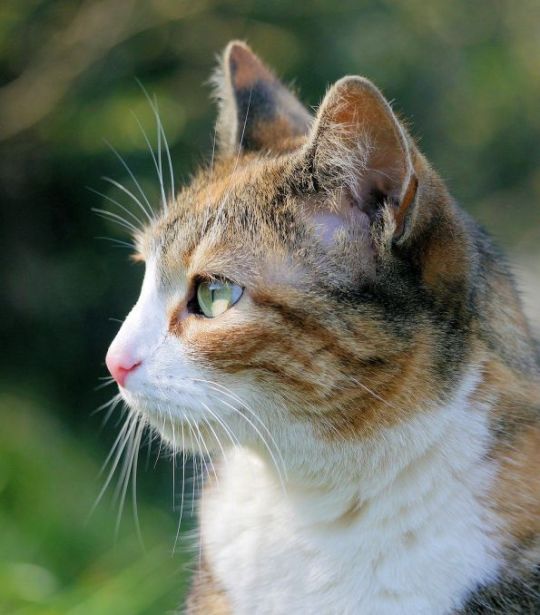
Quotes and aphorisms on animals Quotes and aphorisms on animals by famous authors, writers, artists and men of science to remind us the importance of animals for our lives and our planet earth. World Animal Day is an international day of action for animal rights and welfare. It is celebrated on October 4 each year, the feast day of Francis of Assisi, the patron saint of animals. The elephant, not only the largest but the most intelligent of animals, provides us with an excellent example. It is faithful and tenderly loving to the female of its choice, mating only every third year and then for no more than five days, and so secretly as never to be seen, until, on the sixth day, it appears and goes at once to wash its whole body in the river, unwilling to return to the herd until thus purified. Such good and modest habits are an example to husband and wife. St. Francis De Sales Animals, in their generation, are wiser than the sons of men; but their wisdom is confined to a few particulars, and lies in a very narrow compass. Joseph Addison Of all the wonders of nature, a tree in summer is perhaps the most remarkable; with the possible exception of a moose singing "Embraceable You" in spats. Woody Allen Man is an animal endowed with reason, but also with much stupidity. Carl William Brown At his best, man is the noblest of all animals; separated from law and justice he is the worst. Aristotle Drinking, when we are not thirsty and making love all year round, madam; that is all there is to distinguish us from other animals. Pierre De Beaumarchais The dog is the god of frolic. Henry Ward Beecher I shoot the Hippopotamus with bullets made of platinum, because if I use the leaden one his hide is sure to flatten em. Hilaire Belloc

Quotes on animals Scientific laws are still a product of man, that's why I, first of all, dedicate myself to the study of this amazing animal. Carl William Brown A peasant becomes fond of his pig and is glad to salt away its pork. What is significant, and is so difficult for the urban stranger to understand, is that the two statements are connected by an and not by a but. John Berger Politicians are none of my business… I was struck by the fact that they live a dog's life without the manners of a dog. Rudyard Kipling Bats have no bankers and they do not drink and cannot be arrested and pay no tax and, in general, bats have it made. John Berryman A dog is the only thing on earth that loves you more than you love yourself. Josh Billings A hen is only an egg's way of making another egg. Samuel Butler If you take a starving dog and fatten him up, he will not bite you. That is the main difference between a dog and a man. Mark Twain The road to understanding man passes through understanding the animal, just as the road to the birth of man undoubtedly passed through the animal. Konrad Lorenz Brothers, love the beasts: God has given them the beginning of thought and peaceful joy. Do not torment them, do not disturb them, do not take away their joy, do not oppose the purpose of God. Man, do not exalt yourself above the animals. F. Dostoevskij Man is the only animal that can remain on friendly terms with the victims he intends to eat until he eats them. Samuel Butler The poor dog, in life the firmest friend. The first to welcome, foremost to defend. Lord Byron Humans are the only animals that have a highly developed brain; perhaps that is why they are so avidly aggressive. Carl William Brown Animals awaken, first facially, then bodily. Men's bodies wake before their faces do. The animal sleeps within its body, man sleeps with his body in his mind. Malcolm De Chazal Always remember, a cat looks down on man, a dog looks up to man, but a pig will look man right in the eye and see his equal. Winston Churchill Poor little Foal of an oppressed race! I love the languid patience of thy face. Samuel Taylor Coleridge Shall we never have done with that cliche, so stupid that it could only be human, about the sympathy of animals for man when he is unhappy? Animals love happiness almost as much as we do. A fit of crying disturbs them, they'll sometimes imitate sobbing, and for a moment they'll reflect our sadness. But they flee unhappiness as they flee fever, and I believe that in the long run they are capable of boycotting it. Gabrielle Colette For the warriors of the pre-Christian era, a dragon was a fairly dangerous animal; for the students of the 21st century after Christ, a wasp is a very dangerous beast. Carl William Brown A fence should be horse high, hog tight and bull strong. Author Unknown Animals are such agreeable friends, they ask no questions, they pass no criticisms. George Eliot Who can guess how much industry and providence and affection we have caught from the pantomime of brutes? Ralph Waldo Emerson Be as a bird perched on a frail branch that she feels bending beneath her, still she sings away all the same, knowing she has wings. Victor Hugo Animals are in possession of themselves; their soul is in possession of their body. But they have no right to their life, because they do not will it. Georg Hegel Animals are stylized characters in a kind of old saga -- stylized because even the most acute of them have little leeway as they play out their parts. Edward Hoagland Animals used to provide a lowlife way to kill and get away with it, as they do still, but, more intriguingly, for some people they are an aperture through which wounds drain. The scapegoat of olden times, driven off for the bystanders sins, has become a tender thing, a running injury. There, running away is me: hurt it and you are hurting me. Edward Hoagland Nothing to be done really about animals. Anything you do looks foolish. The answer isn't in us. It's almost as if we're put here on earth to show how silly they aren't. Russell Hoban Animals often strike us as passionate machines. Eric Hoffer From the oyster to the eagle, from the swine to the tiger, all animals are to be found in men and each of them exists in some man, sometimes several at the time. Animals are nothing but the portrayal of our virtues and vices made manifest to our eyes, the visible reflections of our souls. God displays them to us to give us food for thought. Victor Hugo The better I know men the more I admire dogs. Author Unknown I have enforced the law against killing certain animals and many others, but the greatest progress of righteousness among men comes from the exhortation in favor of non-injury to life and abstention from killing living beings. King Asoka of India Cats and monkeys; monkeys and cats: all human life is there. Henry James Don't accept your dog's admiration as conclusive evidence that you are wonderful. Ann Landers Be a good animal, true to your animal instincts. D. H. Lawrence I distrust camels, and anyone else who can go a week without a drink. Joe E. Lewis Animals are considered as property only. To destroy or to abuse them, from malice to the proprietor, or with an intention injurious to his interest in them, is criminal. But the animals themselves are without protection. The law regards them not substantively. They have no RIGHTS! Shirley Lord Eagles do not beget Doves. Motto The cow is of the bovine ilk: One end is moo, the other, milk. Ogden Nash We know what the animals do, what are the needs of the beaver, the bear, the salmon, and other creatures, because long ago men married them and acquired this knowledge from their animal wives. Today the priests say we lie, but we know better. Native Americans I fear animals regard man as a creature of their own kind which has in a highly dangerous fashion lost its healthy animal reason -- as the mad animal, as the laughing animal, as the weeping animal, as the unhappy animal. Friedrich Nietzsche Happiness to a dog is what lies on the other side of a door. Charleton Jr. Ogburn The owl of ignorance lays the egg of pride. Author Unknown Four legs good, two legs bad. George Orwell In a few generations more, there will probably be no room at all allowed for animals on the earth: no need of them, no toleration of them. An immense agony will have then ceased, but with it there will also have passed away the last smile of the world's youth. Ouida Nothing can be more obvious than that all animals were created solely and exclusively for the use of man. Thomas Love Peacock There is something in the unselfish and self-sacrificing love of a brute, which goes directly to the heart of him who has had frequent occasion to test the paltry friendship and gossamer fidelity of mere Man. Edgar Allan Poe The zebra told the white horse, "I am white," and told the black horse, "I am actually black." African Proverb The fatter the flea the leaner the dog. German Proverb Who loves me loves my dog. Latin Proverb Cows are amongst the gentlest of breathing creatures; none show more passionate tenderness to their young when deprived of them. And, in short, I am not ashamed to profess a deep love for these quiet creatures. Thomas De Quincey No matter how eloquently a dog may bark, he cannot tell you that his parents were poor, but honest. Bertrand Russell Man is a clever animal who behaves like an imbecile. Albert Schweitzer What is man without the beasts? If all the beasts were gone, man would die from a great loneliness of spirit. For whatever happens to the beasts, soon happens to man. All things are connected. Chief Seattle Those who wish to pet and baby wild animals, "love" them. But those who respect their natures and wish to let them live normal lives, love them more. Edwin Way Teale The keeping of bees is like the direction of sunbeams. Henry David Thoreau What is a country without rabbits and partridges? They are among the most simple and indigenous animal products; ancient and venerable families known to antiquity as to modern times; of the very hue and substance of Nature, nearest allied to leaves and to the ground. Henry David Thoreau An eagle does not catch flies. Author Unknown If it wasn't for dogs, some people would never go for a walk. Author Unknown Animals have these advantages over man: They have no theologians to instruct them, their funerals cost them nothing, and no one starts lawsuits over their wills. Francois-Marie Arouet de Voltaire They do not sweat and whine about their condition, they do not lie awake in the dark and weep for their sins, they do not make me sick discussing their duty to God, not one is dissatisfied, not one is demented with the mania of owning things, not one kneels to another, nor to his kind that lived thousands of years ago. Walt Whitman The best thing about animals is they don't talk much. Thornton Wilder Quotes by authors Quotes by arguments Thoughts and reflections Essays with quotes Read the full article
#animalrights#animalwelfare#animalwellness#animals#aphorismsonanimals#FrancisofAssisi#patronsaintofanimals#quotesonanimals#WorldAnimalDay
15 notes
·
View notes
Text



Kaa (1995) by Rajiv Desai, Charles Rosenberg, and Joseph Jones, IS Robotics (iRobot), Somerville, MA. Taking its name from Rudyard Kipling's "The Jungle Book," Kaa is a pair of serpentine arms able to grasp objects by wrapping itself around them, with force servoing giving it that extra squeeze. It has two arms, each 1ft long; a total of thirteen links with individual torque sensors. Each arm terminates in a single rounded fingertip that includes an infrared (IR) proximity sensor. The central body contains power and compute provided by three 8 bit Motorola 6811 microprocessors; one for servo control, one for behaviour control, and the other for IR control. Kaa is best known for acting as the arms of Rodney Brooks' IT (final photo).
46 notes
·
View notes
Text
The Guardians: How Jack Frost entered a snowball fight with Winston Churchill, J.M. Barrie and Rudyard Kipling
Extracted from Jack Frost: The End Becomes the Beginning by William Joyce

Historical side of Tumblr, did they really knew each other in real life, or is Joyce just going mad as usual 😂
It was a piercingly cold winter night. Jack was leaving the Athenaeum Club. He belongs to many clubs. Private clubs are a vital function of the social life of young and old men in this whirligig era. These clubs are elegant and brimming with friendships, rivalries, and the excitable friction of men with ambition and ideas. It is at the Athenaeum that Jack has made some of his most interesting friendships.
On the night of this report, Frost was seen walking out of the festive warmth of the club with three companions. They were bundled against the cold, laughing and chatting as they trekked their way down the snow-covered steps to the street. As is his habit, Jack hung back a few paces. He enjoys observing the easy joviality of his friends at the end of an evening of fun.
The most affable of the three is young Winston Leonard Spencer-Churchill, whose booming laugh and manner reminds Jack of his old friend Nicholas St. North. Churchill had been a devilish child, full of mischief, and had been kicked out of most of the finest schools in Europe. On this evening he is smoking a huge cigar and is at this point singing the song of one of the schools he had attended.
“Sandhurst was a great school with a wretched song!” he shouted out, interrupting himself midchorus. The other two friends, Joseph Rudyard Kipling and James Matthew Barrie, are both writers of some renown, though tonight they were singing the song of a school they had never attended and were doing so with considerable volume and enthusiasm.
“It would jolly well help if we knew the words,” said Kipling, laughing, but this ignorance did not seem to hamper his and Barrie’s happy attempt.
Jack grinned. He liked his friends best when they behaved less like adults and more like children.
But as the group reached the sidewalk, they passed a huddle of street children who stood shivering in the evening air.
“Please, sirs, a penny for the hungry,” said one child with a practiced, hopeful desperation.
Jack’s friends did not even glance the children’s way. These children were cold and close to starving. Jack saw the ragged clothes. The thin, lanky legs and skinned elbows. Again Jack stayed back, watching as his friends continued down the street.
The children stood quiet and shivering. They watched the happy threesome stagger and wail down the street.
Jack appeared angry with his friends. He knew they may have had childhoods of comfort, but each had experienced great turbulence and heartbreak in their youths. They should not, could not, would not ignore the wretched children they had just passed. They must be made to listen.
So Jack made himself invisible. It is a power he uses subtly. If a party is dull, he will simply disappear. Or if he wants to secretly influence the outcome of an event, being unseen makes his efforts much easier.
At this point in the proceedings he discreetly launched three expertly constructed snowballs at his friends.
Each hit its mark.
All three men’s hats were knocked to the snowy ground. The three then spun around and stared at the children. The children stared back.
Apparently, a war had silently been declared.
“This aggression must not go unanswered,” muttered Churchill as he, Kipling, and Barrie crouched down and began busily packing snowballs.
Though invisible, we surmise that Jack was delighted. He whispered to various children, “Better get busy. They’re bigger than you.” They instantly fell to their knees and began to pack snowballs themselves.
Churchill and Kipling both have military histories and have seen battle, so they knew the necessity of a steady supply of ammunition. Barrie, as records , is the worst shot of the three, so he continued making snowballs while his cohorts took up positions behind a lamppost and a mailbox.
“Wait for my command,” said Churchill, puffing his cigar.
The children were seasoned snowball makers, and they had amassed an impressive hoard of ammo. They wereready to attack, but they seemed uncertain. Again Jack intervened. “Concentrate on the one with the cigar.”
The children were so focused on their enemy that they hadn’t even noticed that Jack was nowhere to be seen. They heard his suggestion, and without questioning it, they acted.
And charged! Their battle cry was high, shrill, and impressive. Eight little voices sounded like an army.
“My word,” said Kipling, astonished.
“Steady!” commanded Churchill.
Barrie stopped his constructions and readied for the attack, a snowball in each hand and several in each pocket.
In an instant the children were upon them. The air was thick with snowballs and shouting and cheers.
“Fire!” yelled Churchill, but his command was muffled by five or six direct hits on his head and shoulders. He fell backward and lay on the street as helpless as an overturned turtle. Four children stood over him and pounded him with snowballs.
“My cigar!” he yelped. And indeed his cigar had been knocked from his mouth, landing somewhere inside his coat.
Kipling and Barrie tried to lend aid, but both were hit with such accuracy that their eyeglasses were caked with thick clumps of snow and neither could see a thing.
The three men were being overwhelmed, routed, in fact. But suddenly, the tide of the battle changed. Twenty or so members of the Athenaeum Club had seen the skirmish from the windows and were rushing out to lend a hand.
Jack had reappeared and raised his staff, and within an instant, he brought about a blinding gale of snow to slow the Athenaeum men.
A smallish boy who looked particularly ragged raised two fingers to his mouth and let out a high, sharp whistle that could be heard for blocks. The boy had not finished his first note when children began to appear from seemingly every direction and swarm toward the fray.
And so this snowball battle became epic. Adults against children. Jack watched with astonishment. What had he triggered?
Old men — older than eighty — who minutes before could barely hobble with canes across a plush dining room carpet, were now rippling over snow-snow-covered cobblestones with the vigor and skill of Roman gladiators.
Gangly half-starved children, some as young as five years old, were standing their ground or attacking with the stalwart cunning of the most seasoned generals.
The blur of a thousand snowballs glistened in the streetlamps’ glow as cheers and laughter of pure exultant joy filled the air. The strange untethered glee of making pretend war with well-packed snow had turned men into boys, and children into heroes.
Jack returned to invisibility, but he stayed in the thick of this battle royal, flying from place to place faster than any snowball. He was heard shouting instructions or guidance to anyone he felt was in need. At first he only helped the children, but as the ruckus continued, he began to urge the Athenaeums on.
So focused were the combatants that none ever wondered who was helping them.
The fight reached a pitch so fevered that one by one participants began to collapse with exhaustion and merriment. There were calls of:
“Stop! Enough!”
“I surrender!”
“I’m done!”
Shouts became laughter. The din of the battle dissolved into a singsong of helpless giggling and gasping and guffaws.
Churchill struggled to his feet. He was laughing with more gusto than anyone. He pulled his still-lit cigar from some deep fold of his coat and took a long and satisfying puff.
“I suggest we call an end to these hostilities,” he said to the spent troops. “I suggest we call this battle a draw.” He took another puff.
The half-block heap of young and old sat panting, their warm breath making a wheezing fog around them.
“I say we are all victors, and so to all must go the spoils,” Churchill continued. “Let us retire to the warmth of the club. I urge that we leave the snow to fall in peace and that we feast like kings!”
Cheers of agreement rang out. As they helped one another to their feet, Churchill began again to sing his old school song, the song of his beloved Sandhurst:
“And so from those who have gone before, to those who are yet to come,
We pass our motto loud and clear, all evil overcome.
As true as is a brother’s love, as close as ivy grows,
We’ll stand four square through our lives to every wind that blows.”
It was then that Frost tactfully reappeared as stealthily as he’d vanished in the first place. Smiling, he watched the scene unfold. Churchill slapped him on the back, still in full-throated song and joined by all who knew the words.

@ariel-seagull-wings @thealmightyemprex @princesssarisa @angelixgutz @amalthea9 @the-blue-fairie @tamisdava2 @mask131
23 notes
·
View notes
Text
i went to a used book sale today... procured:
railroad color history: new york central railroad (brian solomon & mike schafer) — i'm not actually that into trains but it appealed to me.
the complete guide to the soviet union (jennifer louis & victor louis) — travel guide from 1980
an anthology including the big sleep (raymond chandler), "the undignified melodrama of the bone of contention" (dorothy l. sayers), "the arrow of god" (leslie charteris), "i can find my way out" (ngaio marsh), instead of evidence (rex stout), "rift in the loot" (stuart palmer & craig rice), "the man who explained miracles" (john dickson carr), & rebecca (daphne du maurier) (i already have this one..) — it's volume 2 of something (a treasury of great mysteries) which annoys me but whatever
an anthology including "godmother tea" (selena anderson), "the apartment" (t. c. boyle), "a faithful but melancholy account of several barbarities lately committed" (jason brown), "sibling rivalry" (michael byers), "the nanny" (emma cline), "halloween" (mariah crotty), "something street" (carolyn ferrell), "this is pleasure" (mary gaitskill), "in the event" (meng jin), "the children" (andrea lee), "rubberdust" (sarah thankam mathews), "it's not you" (elizabeth mccracken), "liberté" (scott nandelson), "howl palace" (leigh newman), "the nine-tailed fox explains" (jane pek), "the hands of dirty children" (alejandro puyana), "octopus vii" (anna reeser), "enlightenment" (william pei shih), "kennedy" (kevin wilson), & "the special world" (tiphanie yanique) — i guess they're all short stories published in 2020 by usamerican/canadian authors
an anthology including the death of ivan ilyich (leo tolstoy) (i have already read this one..), the beast in the jungle (henry james), heart of darkness (joseph conrad), seven who were hanged (leonid andreyev), abel sánchez (miguel de unamuno), the pastoral symphony (andré gide), mario and the magician (thomas mann), the old man (william faulkner), the stranger (albert camus), & agostino (alberto moravia)
the ambassadors (henry james)
the world book desk reference set: book of nations — it's from 1983 so this is kind of a history book...
yet another fiction anthology......... including the general's ring (selma lagerlöf), "mowgli's brothers" (rudyard kipling), "the gift of the magi" (o. henry) (i have already read this one..), "lord mountdrago" (w. somerset maugham), "music on the muscatatuck" (jessamyn west), "the pacing goose" (jessamyn west), "the birds" (daphne du maurier), "the man who lived four thousand years" (alexandre dumas), "the pope's mule" (alphonse daudet), "the story of the late mr. elvesham" (h. g. wells), "the blue cross" (g. k. chesterton), portrait of jennie (robert nathan), "la grande bretèche" (honoré de balzac), "love's conundrum" (anthony hope), "the great stone face" (nathaniel hawthorne), "germelshausen" (friedrich gerstäcker), "i am born" (charles dickens), "the legend of sleepy hollow" (washington irving), "the age of miracles" (melville davisson post), "the long rifle" (stewart edward white), "the fall of the house of usher" (edgar allan poe) (i have already read this one..), the voice of bugle ann (mackinlay kantor), the bridge of san luis rey (thornton wilder), "basquerie" (eleanor mercein kelly), "judith" (a. e. coppard), "a mother in mannville" (marjorie kinnan rawlings), "kerfol" (edith wharton), "the last leaf" (o. henry), "the bloodhound" (arthur train), "what the old man does is always right" (hans christian anderson), the sea of grass (conrad richter), "the sire de malétroit's door" (robert louis stevenson), "the necklace" (guy de maupassant) (i have already read this one..), "by the waters of babylon" (stephen vincent benét), a. v. laider (max beerbohm), "the pillar of fire" (percival wilde), "the strange will" (edmond about), "the hand at the window" (emily brontë) (i have already read this one..), & "national velvet" (enid bagnold) — why are seven of these chapters of novels....? anyway fun fact one of the compilers here also worked on the aforementioned mystery anthology. also anyway Why did i bother to write all that ☹️
fundamental problems of marxism (georgi plekhanov) — book about dialectical/historical materialism which is published here as the first volume of something (marxist library) which is kind of odd to me tbh
one last (thankfully tiny) anthology including le père goriot (honoré de balzac) & eugénie grandet (honoré de balzac)
6 notes
·
View notes
Text
18 gennaio ... ricordiamo ...
18 gennaio … ricordiamo … #semprevivineiricordi #nomidaricordare #personaggiimportanti #perfettamentechic
2022: André Leon Talley, giornalista statunitense. (n.1949) 2022: Yvette Mimieux, all’anagrafe Yvette Carmen Vivieux, attrice statunitense che è stata in attività nel cinema e in televisione. Sposò il regista cinematografico Stanley Donen e Howard RubyNon ebbe figli. (n.1942) 2021: Catherine Rich, Catherine Simone Henriette Marie Renaudin, attrice francese. Sposò Claude Rich e nacquero due…
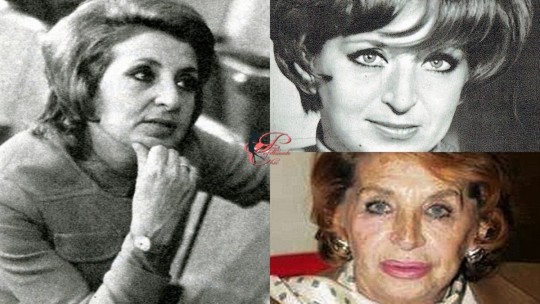
View On WordPress
#18 gennaio#Adriana Caselotti#André Leon Talley#Catherine Rich#Catherine Simone Henriette Marie Renaudin#Cecil Beaton#Charles John Holt#Diana Lewis#Frances Dean#Frances Drake#Gene Colonnello#Gertrude Olmstead#Grisina#Jack Holt#Joseph Rudyard Kipling#Kathleen Byron#Kathleen Elizabeth Fell#Lois June Nettleton#Lois Nettleton#Luciano Re Cecconi#Madame Grisina#Morti oggi#Nancy Coleman#Renato Guttuso#Ricordando ..#Sarah Lynne Marshall#Sarah Marshall#Sir Cecil Walter Hardy Beaton#Teresina Negri#Valentina Frascaroli
0 notes
Text
How many have you read out of the hundred?
Me: 64/100
Reblog & share your results
1. "Pride and Prejudice" by Jane Austen
2. "Crime and Punishment" by Fyodor Dostoevsky
3. "To Kill a Mockingbird" by Harper Lee
4. "1984" by George Orwell
5. "Great Expectations" by Charles Dickens
6. "One Hundred Years of Solitude" by Gabriel García Márquez
7. "Jane Eyre" by Charlotte Brontë
8. "The Catcher in the Rye" by J.D. Salinger
9. "War and Peace" by Leo Tolstoy
10. "The Great Gatsby" by F. Scott Fitzgerald
11. "Moby-Dick" by Herman Melville
12. "The Odyssey" by Homer
13. "Wuthering Heights" by Emily Brontë
14. "Anna Karenina" by Leo Tolstoy
15. "The Brothers Karamazov" by Fyodor Dostoevsky
16. "The Iliad" by Homer
17. "Frankenstein" by Mary Shelley
18. "Les Misérables" by Victor Hugo
19. "Don Quixote" by Miguel de Cervantes
20. "Middlemarch" by George Eliot
21. "The Picture of Dorian Gray" by Oscar Wilde
22. "The Scarlet Letter" by Nathaniel Hawthorne
23. "Dracula" by Bram Stoker
24. "Sense and Sensibility" by Jane Austen
25. "The Hunchback of Notre-Dame" by Victor Hugo
26. "The War of the Worlds" by H.G. Wells
27. "The Grapes of Wrath" by John Steinbeck
28. "The Canterbury Tales" by Geoffrey Chaucer
29. "The Portrait of a Lady" by Henry James
30. "The Jungle Book" by Rudyard Kipling
31. "Siddhartha" by Hermann Hesse
32. "The Divine Comedy" by Dante Alighieri
33. "A Tale of Two Cities" by Charles Dickens
34. "The Trial" by Franz Kafka
35. "Mansfield Park" by Jane Austen
36. "The Three Musketeers" by Alexandre Dumas
37. "Fahrenheit 451" by Ray Bradbury
38. "Gulliver's Travels" by Jonathan Swift
39. "The Sound and the Fury" by William Faulkner
40. "Emma" by Jane Austen
41. "Robinson Crusoe" by Daniel Defoe
42. "Tess of the d'Urbervilles" by Thomas Hardy
43. "The Republic" by Plato
44. "Heart of Darkness" by Joseph Conrad
45. "The Hound of the Baskervilles" by Arthur Conan Doyle
46. "The Strange Case of Dr Jekyll and Mr Hyde" by Robert Louis Stevenson
47. "The Prince" by Niccolò Machiavelli
48. "The Metamorphosis" by Franz Kafka
49. "The Old Man and the Sea" by Ernest Hemingway
50. "Bleak House" by Charles Dickens
51. "Gone with the Wind" by Margaret Mitchell
52. "The Plague" by Albert Camus
53. "The Joy Luck Club" by Amy Tan
54. "The Master and Margarita" by Mikhail Bulgakov
55. "The Red and the Black" by Stendhal
56. "The Sun Also Rises" by Ernest Hemingway
57. "The Fountainhead" by Ayn Rand
58. "The Bell Jar" by Sylvia Plath
59. "The Idiot" by Fyodor Dostoevsky
60. "The Book Thief" by Markus Zusak
61. "The Return of Sherlock Holmes" by Arthur Conan Doyle
62. "The Woman in White" by Wilkie Collins
63. "Things Fall Apart" by Chinua Achebe
64. "Treasure Island" by Robert Louis Stevenson
65. "Ulysses" by James Joyce
66. "Uncle Tom's Cabin" by Harriet Beecher Stowe
67. "Vanity Fair" by William Makepeace Thackeray
68. "Waiting for Godot" by Samuel Beckett
69. "Walden Two" by B.F. Skinner
70. "Watership Down" by Richard Adams
71. "White Fang" by Jack London
72. "Wide Sargasso Sea" by Jean Rhys
73. "Winnie-the-Pooh" by A.A. Milne
74. "Wise Blood" by Flannery O'Connor
75. "Woman in the Nineteenth Century" by Margaret Fuller
76. "Women in Love" by D.H. Lawrence
77. "Zen and the Art of Motorcycle Maintenance" by Robert M. Pirsig
78. "The Aeneid" by Virgil
79. "The Age of Innocence" by Edith Wharton
80. "The Alchemist" by Paulo Coelho
81. "The Art of War" by Sun Tzu
82. "The Autobiography of Benjamin Franklin" by Benjamin Franklin
83. "The Awakening" by Kate Chopin
84. "The Big Sleep" by Raymond Chandler
85. "The Bluest Eye" by Toni Morrison
86. "The Caine Mutiny" by Herman Wouk
87. "The Cherry Orchard" by Anton Chekhov
88. "The Chosen" by Chaim Potok
89. "The Christmas Carol" by Charles Dickens
90. "The City of Ember" by Jeanne DuPrau
91. "The Clue in the Crumbling Wall" by Carolyn Keene
92. "The Code of the Woosters" by P.G. Wodehouse
93. "The Color Purple" by Alice Walker
94. "The Count of Monte Cristo" by Alexandre Dumas
95. "The Crucible" by Arthur Miller
96. "The Crying of Lot 49" by Thomas Pynchon
97. "The Da Vinci Code" by Dan Brown
98. "The Death of Ivan Ilyich" by Leo Tolstoy
99. "The Decline and Fall of the Roman Empire" by Edward Gibbon
100. "The Divine Secrets of the Ya-Ya Sisterhood" by Rebecca Wells
#book#booklr#books#classical literature#classic academia#penguin clothbound classics#classical books#english literature#listing#that's bloody#william shakespeare#shakespeare#anne frank#the odyssey#the divine comedy#french#literature
13 notes
·
View notes
Text
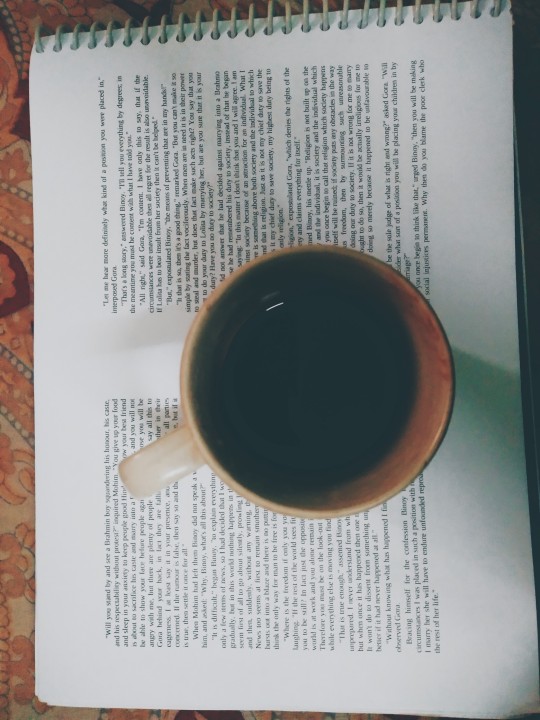
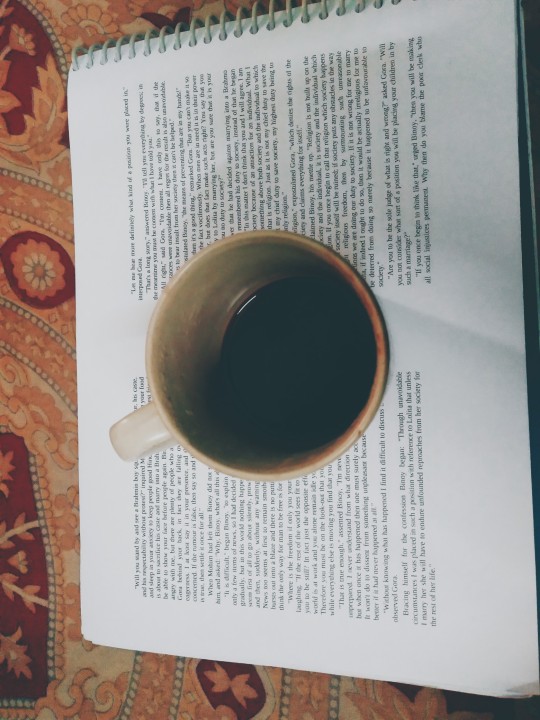
~ a lot has changed since i last posted.
17. 03. 22
i plan to finish gora [rabindranath tagore] by today. i've more course work to do. i've another text - heart of darkness [joseph conrad]. reference texts include - kim [rudyard kipling] and things fall apart [chinua achebe]. i have an internal assessment on monday. more reference/research work is to be done. gora is a very long text and at this point it seems so frustatingly long, i'm trying not to break down. anyway.
#study aesthetic#study blog#study hard#studyblr#studystudystudy#study tips#study notes#study#study motivation#study space#read#reading#readblr#book reading#currently reading#gora#rabindranath tagore#internal assessment#university student#tired#productivity#final semester#long reads#books#bookblr#book#studyvan#myhoneststudyblr#reading lists#book reccomendation
62 notes
·
View notes
Text
"If" Rudyard Kipling.
"If—" is a poem by Rudyard Kipling, first published in 1910. It is a timeless piece of literature that offers wisdom and advice on how to navigate the challenges and uncertainties of life. Here is the poem "If"
"If you can keep your head when all about you Are losing theirs and blaming it on you,
If you can trust yourself when all men doubt you, But make allowance for their doubting too;
If you can wait and not be tired by waiting, Or being lied about, don’t deal in lies, Or being hated, don’t give way to hating, And yet don’t look too good, nor talk too wise:
If you can dream—and not make dreams your master; If you can think—and not make thoughts your aim;
If you can meet with Triumph and Disaster And treat those two impostors just the same; If you can bear to hear the truth you’ve spoken Twisted by knaves to make a trap for fools, Or watch the things you gave your life to, broken, And stoop and build ’em up with worn-out tools:
If you can make one heap of all your winnings And risk it on one turn of pitch-and-toss, And lose, and start again at your beginnings And never breathe a word about your loss;
If you can force your heart and nerve and sinew To serve your turn long after they are gone, And so hold on when there is nothing in you Except the Will which says to them: 'Hold on!'
If you can talk with crowds and keep your virtue, Or walk with Kings—nor lose the common touch,
If neither foes nor loving friends can hurt you, If all men count with you, but none too much;
If you can fill the unforgiving minute With sixty seconds’ worth of distance run, Yours is the Earth and everything that’s in it, And—which is more—you’ll be a Man, my son!"
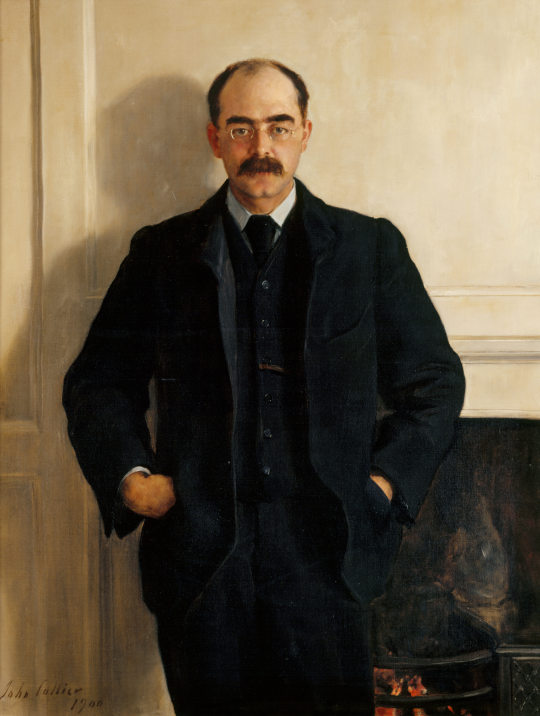
This poem is often regarded as a guide for personal integrity, perseverance, and maintaining one's composure in the face of adversity.
Joseph Rudyard Kipling was an English novelist, short-story writer, poet, and journalist. He was born in British India.
Born: 30 December 1865, Mumbai, India
Died: 18 January 1936, London.
Childhood in India: Kipling was born on December 30, 1865, in Bombay, British India (now Mumbai, India). His early years were spent in India, and the sights and sounds of the country greatly influenced his later works, including some of his most famous stories like "The Jungle Book."
Nobel Prize in Literature: In 1907, Rudyard Kipling became the first English-language writer to be awarded the Nobel Prize in Literature. At the age of 41, he received the prestigious honor, primarily for his narrative mastery and his depiction of British imperialism.
Kipling's Voice: Kipling was an early enthusiast of audio recordings. In 1899, Thomas Edison recorded Kipling reading his poem "If—" on an Edison phonograph, making him one of the first authors to have their voice preserved in this manner. You can still find recordings of his voice online.
War Correspondent: During the late 19th and early 20th centuries, Kipling worked as a war correspondent. He covered the Boer War in South Africa and later the First World War. His experiences as a correspondent and his son's death in World War I deeply affected him and influenced his later writings.
The Kipling Family and Disney: Rudyard Kipling's works, particularly "The Jungle Book," were adapted into successful Disney animated films. Interestingly, Kipling's daughter, Elsie, was instrumental in negotiating the rights with Disney for the adaptation. The films, released in 1967 and 2016, brought Kipling's classic stories to a new generation of audiences.
#If#RudyardKipling#Poetry#Wisdom#LifeLessons#Integrity#Perseverance#Adversity#SelfTrust#Courage#Character#Stoicism#Values#Inspiration#Philosophy#Leadership#Resilience#SelfDevelopment#ClassicLiterature#Guidance#today on tumblr#quotes
2 notes
·
View notes
Text
THE 236 GREATEST PERSONALITIES IN THE ENTIRE KNOWN HISTORY/COLLECTIVE CONSCIOUSNESS OF THIS WORLD! (@INDIES)
ie. THE 236 GREATEST PERSONALITIES IN WORLD HISTORY! (@INDIES)
Rajesh Khanna
Lionel Messi
Leonardo Da Vinci
Online Indie
Muhammad Ali
Joan of Arc
William Shakespeare
Vincent Van Gogh
J. K. Rowling
David Lean
Nadia Comaneci
Diego Maradona
Wolfgang Amadeus Mozart
Meena Kumari
Julius Caesar
Harrison Ford
Ludwig Van Beethoven
William W. Cargill
Fritz Hoffmann-La Roche
Samuel Curtis Johnson
Sam Walton
John D. Rockefeller
Andrew Carnegie
Roy Thomson
Tim Berners-Lee
Marie Curie
James J. Hill
Cornelius Vanderbilt
Roman Polanski
Samuel Slater
J. P. Morgan
Cary Grant
Dmitri Mendeleev
John Harvard
Alain Delon
Ramakrishna Paramhansa (Official God)
The Lumiere Brothers, Auguste & Louis
Carl Friedrich Benz
Michelangelo
Maharishi Mahesh Yogi
Ramana Maharishi
Mark Twain
Swami Sri Yukteswar Giri
Bruce Lee
Bhagwan Krishna (Official God)
Charlemagne
Rene Descartes
John F. Kennedy
Bhagwan Ganesha (Official God)
Walt Disney
Albert Einstein
Nikola Tesla
Alfred Hitchcock
Pythagoras
William Randolph Hearst
Cosimo de’ Medici
Johann Sebastian Bach
Alec Guinness
Nostradamus
Christopher Plummer
Archimedes
Jackie Chan
Guru Dutt
Amma Karunamayi/ Mata Parvati (Official God)
Peter Sellers
Gerard Depardieu
Joseph Safra
Robert Morris
Sean Connery
Petr Kellner
Aristotle Onassis
Usain Bolt
Jack Welch
Alfredo di Stefano
Elizabeth Taylor
Michael Jordan
Paul Muni
Steven Spielberg
Louis Pasteur
Ingrid Bergman
Norma Shearer
Dr. B. R. Ambedkar
Ayn Rand
Jesus Christ (Official God)
Luciano Pavarotti
Alain Resnais
Frank Sinatra
Allah (Official God)
Richard Nixon
Charlie Chaplin
Thomas Alva Edison
Alexander Graham Bell
Wright Brothers
Arjun (of Bhagwan Krishna’s Gita)
Jim Simons
George Lucas
Swami Sri Lahiri Mahasaya
Carl Lewis
Brett Favre
Helen Keller
Bernard Mannes Baruch
Buddha (Official God)
Hugh Grant
K. L. Saigal
Roger Federer
Rash Behari Bose
Tiger Woods
William Blake
Jesse Owens
Claude Miller
Bernardo Bertolucci
Subhash Chandra Bose
Satyajit Ray
Hippocrates
Chiang Kai-Shek
John Logie Baird
Geeta Dutt
Raphael (painter)
Bhagwan Shiva (Official God)
Radha (Ancient Krishna devotee)
George Orwell
Jorge Paulo Lemann
Catherine Deneuve
Pierre-Auguste Renoir
Bill Gates
Bhagwan Ram (Official God)
Michael Phelps
Michael Faraday
Audrey Hepburn
Dalai Lama
Grace Kelly
Mikhail Gorbachev
Vladimir Putin
Galileo Galilei
Gary Cooper
Roger Moore
John Huston
Blaise Pascal
Humphrey Bogart
Rudyard Kipling
Samuel Morse
Wayne Gretzky
Yogi Berra
Barry Levinson
Patrice Chereau (director)
Jerry Lewis
Louis Daguerre
James Watt
Henri Rousseau
Nikita Krushchev
Jack Dorsey
Dev Anand
Elia Kazan
Alexander Fleming
David Selznick
Frank Marshall
Viswanathan Anand
Major Dhyan Chand
Swami Vivekananda
Felix Rohatyn
Sam Spiegel
Anand Bakshi
Victor Hugo
Bhagwan Sri Sathya Sai Baba (Official God)
Steve Jobs
Srinivasa Ramanujam
Lord Hanuman
Stanley Kubrick
Giotto
Voltaire
Diego Velazquez
Ernest Hemingway
Francis Ford Coppola
Michael Douglas
Kirk Douglas
Mario Lemieux
Kishore Kumar
James Stewart
Douglas Fairbanks
Confucius
Babe Ruth
Raj Kapoor
Titian aka Tiziano Vecelli
El Greco
Francisco de Goya
Jim Carrey
Mohammad Rafi
Steffi Graf
Pele
Gustave Courbet
Rani Laxmibai of Jhansi
Milos Forman
Steve Wozniak
Georgia O’ Keeffe
Mala Sinha
Aryabhatta
Magic Johnson
Patanjali
Leo Tolstoy
Tansen
Henry Fonda
Albrecht Durer
Benazir Bhutto
Cal Ripken Jr
Samuel Goldwyn
Mumtaz (actress)
Panini
Nicolaus Copernicus
Pablo Picasso
George Clooney
Olivia de Havilland
Prem Chand
Imran Khan
Pete Sampras
Ratan Tata
Meerabai (16th c. Krishna devotee)
Queen Elizabeth II
Pope John Paul II
James Cameron
Jack Ma
Warren Buffett
Romy Schneider
C. V. Raman
Aung San Suu Kyi
Benjamin Netanyahu
Frank Capra
Michael Schumacher
Steve Forbes
Paramhansa Yogananda
Tom Hanks
Kamal Amrohi
Hans Holbein
Shammi Kapoor
Gerardus Mercator
Edith Piaf
Bhagwan Shirdi Sai Baba (Official God) .
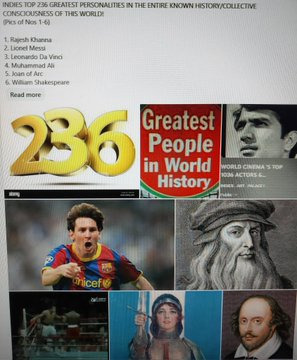
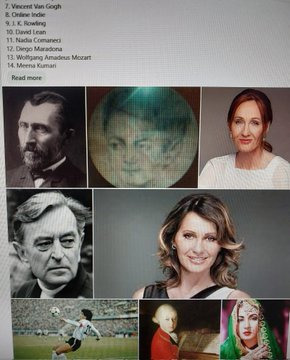
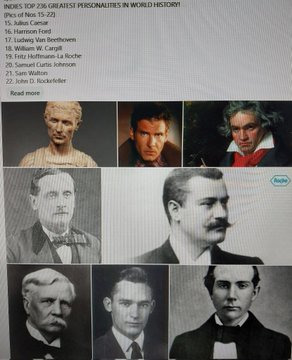
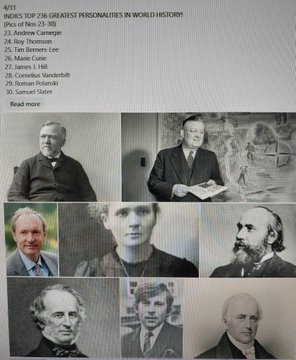
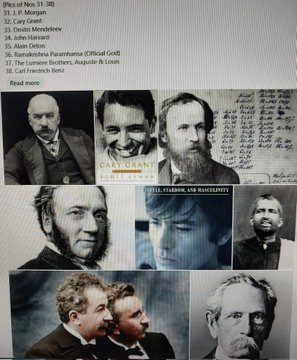

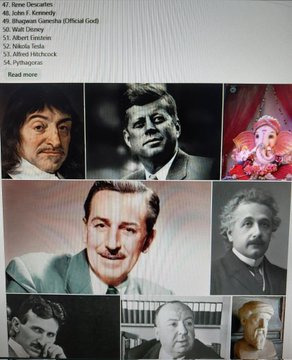
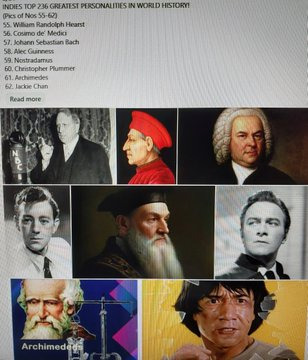
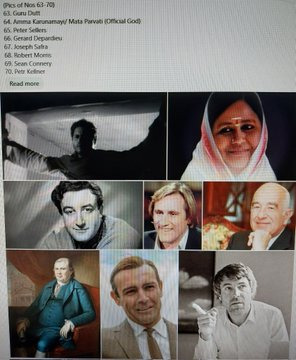
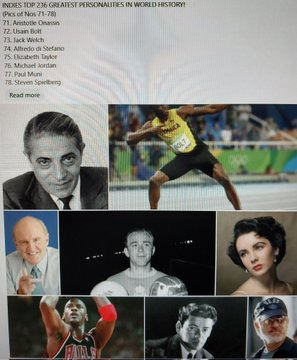
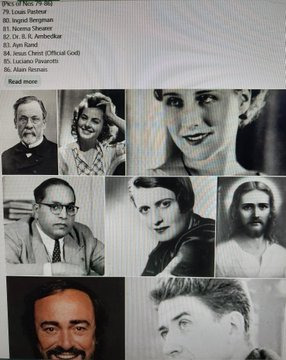
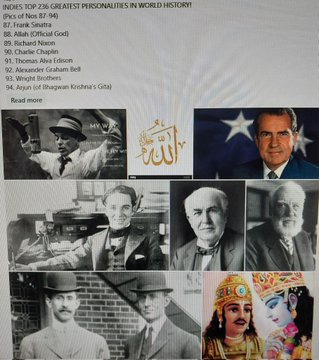
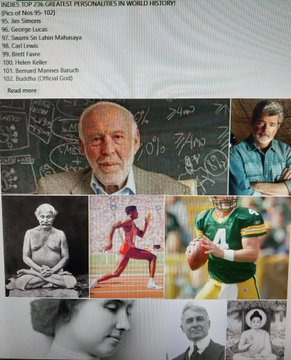
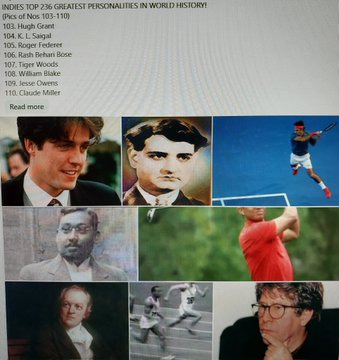
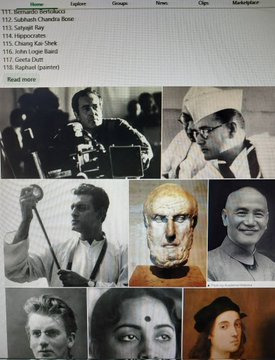
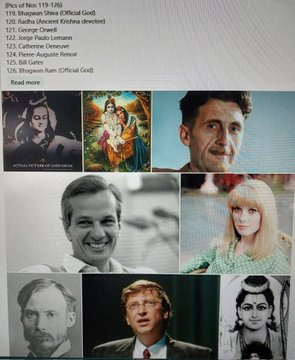
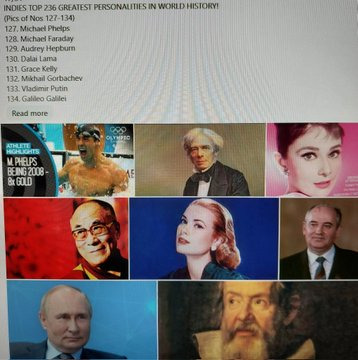
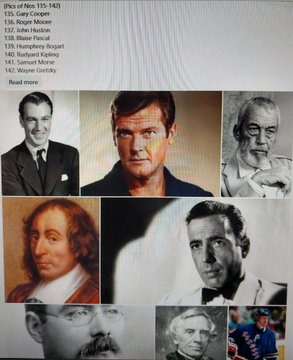
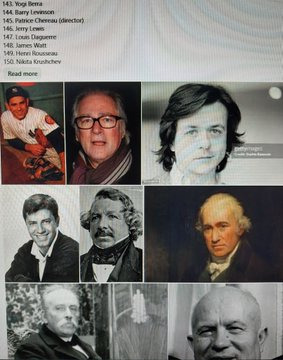
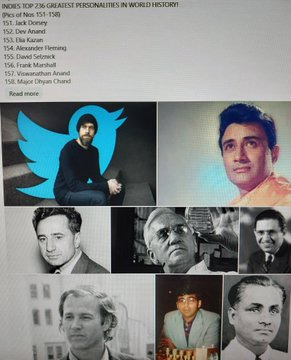
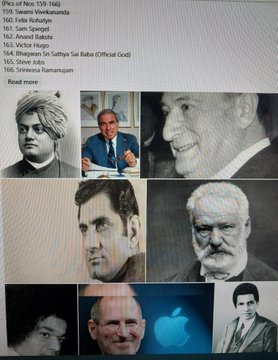
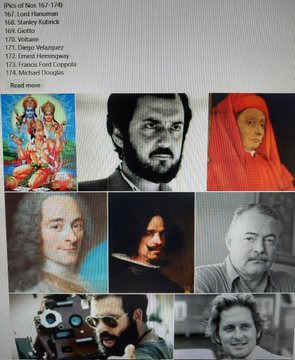
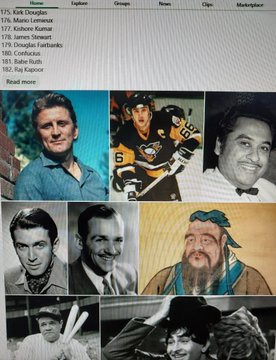
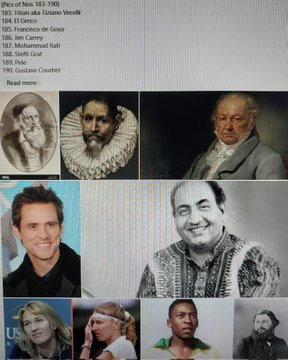
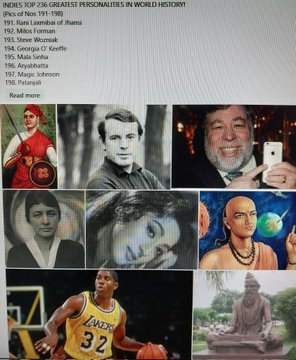
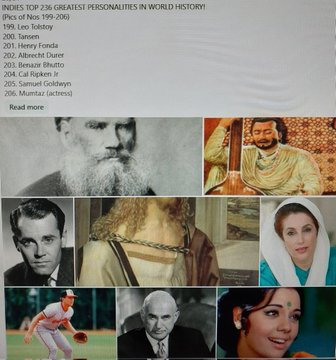
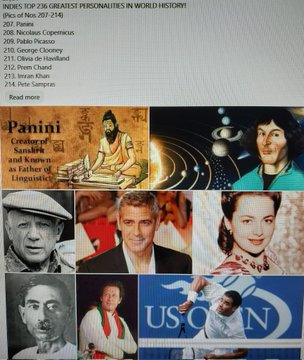
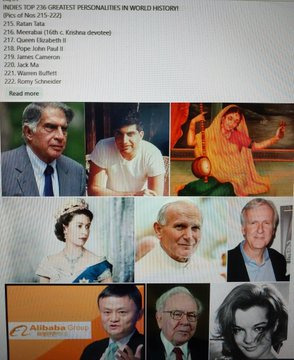
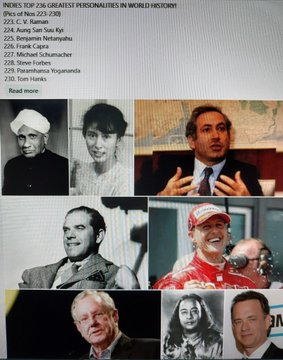
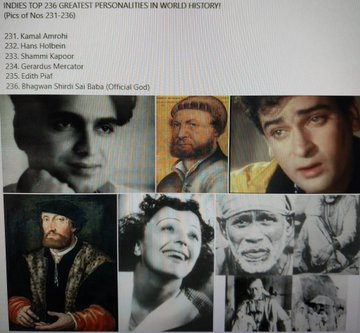
2 notes
·
View notes